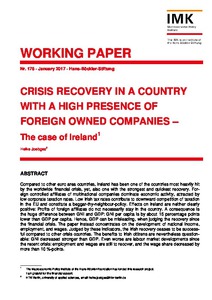Crisis recovery in a country with a high presence of foreign owned companies. The case of Ireland
"Compared to other euro area countries, Ireland has been one of the countries most heavily hit by the worldwide financial crisis, yet, also one with the strongest and quickest recovery. Foreign controlled affiliates of multinational companies dominate economic activity, attracted by low corpora...
| Main Author: | |
|---|---|
| Institution: | ETUI-European Trade Union Institute |
| Format: | TEXT |
| Language: | German |
| Published: |
Düsseldorf
2017
IMK |
| Subjects: | |
| Online Access: | https://www.labourline.org/KENTIKA-751312457959-Crisis-recovery-in-a-country-w.htm |
| Summary: | "Compared to other euro area countries, Ireland has been one of the countries most heavily hit by the worldwide financial crisis, yet, also one with the strongest and quickest recovery. Foreign controlled affiliates of multinational companies dominate economic activity, attracted by low corporate taxation rates. Low Irish tax rates contribute to downward competition of taxation in the EU and constitute a beggar-thy-neighbour-policy. Effects on Ireland are neither clearly positive: Profits of foreign affiliates do not necessarily stay in the country. A consequence is the huge difference between GNI and GDP: GNI per capita is by about 15 percentage points lower than GDP per capita. Hence, GDP can be misleading, when judging the recovery since the financial crisis. The paper instead concentrates on the development of national income, employment, and wages. Judged by these indicators, the Irish recovery ceases to be successful compared to other crisis countries. The benefits to Irish citizens are nevertheless questionable: GNI decreased stronger than GDP. Even worse are labour market developments since the recent crisis: employment and wages are still to recover, and the wage share decreased by more than 10 %-points." |
|---|---|
| Physical Description: | 16 p. Digital |

